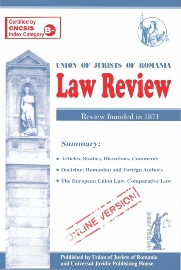DECISION MAKING PROCESS IN THE EUROPEAN UNION AFTER ENTRY INTO FORCE OF THE TREATY OF LISBON
DECISION MAKING PROCESS IN THE EUROPEAN UNION AFTER ENTRY INTO FORCE OF THE TREATY OF LISBON
Author(s): Dan VătămanSubject(s): Law, Constitution, Jurisprudence, Civil Law, International Law, History of European Union, EU-Legislation
Published by: Universul Juridic
Keywords: European Union institutions; decision-making; legislative procedures; co-decision;
Summary/Abstract: Unlike the national systems where the Parliament is the legislative forum, within the European Union the developing of a decision is a process involving several institutions and bodies of the European Union, the legislative procedure being based on the principle of institutional balance. Thus, the uniqueness of European integration is reflected primarily in the institutional architecture within which Members agree to delegate some of their sovereign powers to shared institutions created by the founding treaties, with successive amendments, institutions whose purpose is to ensure democratic participation of Member States to the decision-making. Given the complexity of the European Union legislative process and, especially, that by the entry into force of the Treaty of Lisbon it has been outlined a new institutional architecture and it was given new responsibilities and legislative powers to the European Union institutions, this study aims to highlight features of the European Union legislative process following the adoption of the Lisbon Treaty.
Journal: Law Review
- Issue Year: 2012
- Issue No: 01
- Page Range: 40-50
- Page Count: 11
- Language: English
- Content File-PDF

